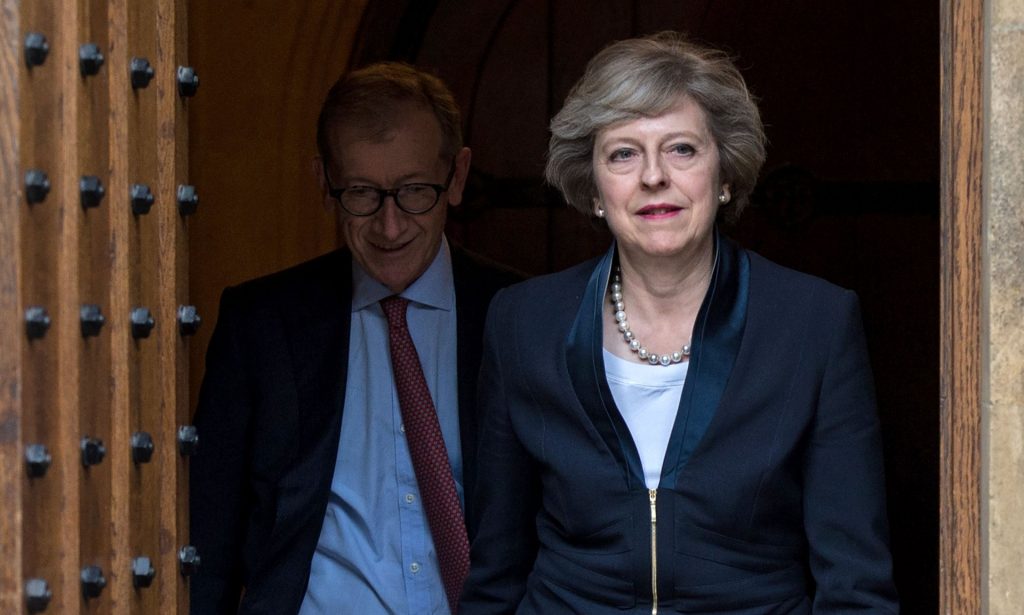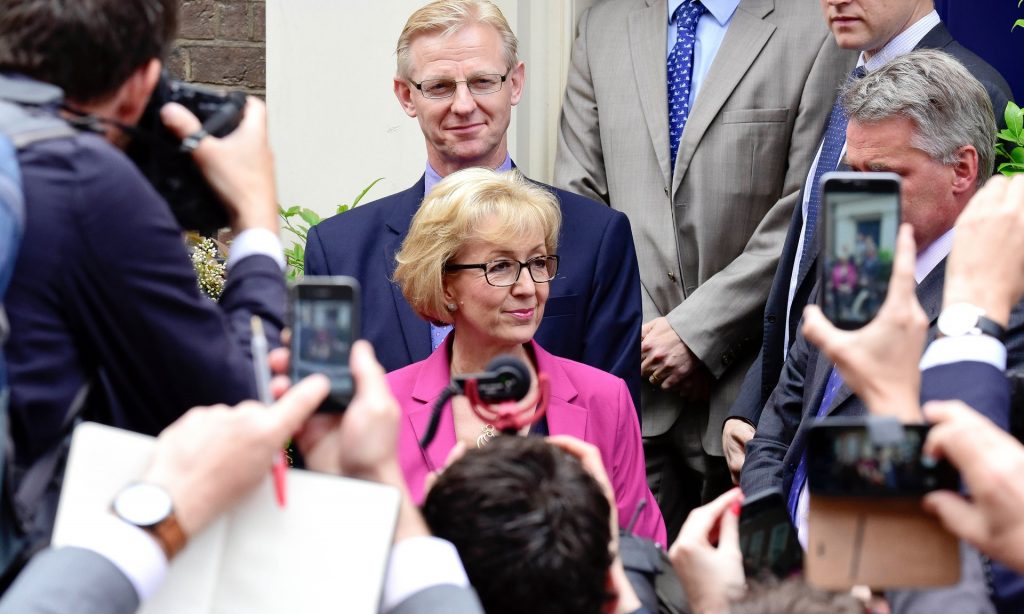
Photograph: Chris Ratcliffe/AFP/Getty Images
David Cameron is expected to mark his final cabinet meeting on Tuesday with some personal remarks about his time as prime minister before welcoming Theresa May into her role as his successor.
There will otherwise be a focus on the normal policy agenda with a view to handing over current priorities to May and her team. Cameron, who until Monday was expected to remain in office until September, had hoped to spend the summer focusing on his cross-government life chances strategy, a policy in which May has expressed interest.
The home secretary will spend her final day before becoming prime minister in her parliamentary office working primarily on putting together her team, who will need to be in place within days.
May will be Britain’s second female prime minister following a rapid ascent to the premiership that came after her sole remaining challenger, Andrea Leadsom, suddenly withdrew from the leadership race which had been expected to last nine weeks.
On Wednesday Cameron will end his six-year tenure in No 10 by offering his resignation to the Queen after prime minister’s questions.
Apart from deciding who will be in her cabinet, May’s most pressing tasks will be trying to unite the party after the battle over Brexit and preparing for the negotiations to leave the European Union.
On Tuesday, one of the leading pro-Brexit Tory MPs, the Northern Ireland secretary, Theresa Villiers, said May should look at triggering article 50 to begin departure from the EU in the autumn.
“I think we need a period to prepare our negotiating position and look at all the options, and I think have some informal negotiations with other European ministers,” Villiers told BBC Radio 4’s Today programme. “I’d certainly think another two or three months of informal discussions.”
Kenneth Clarke, who strongly opposed Britain’s departure from the EU, told Today that if it was going to happen, article 50 should be triggered in the next few weeks. “We can’t just drift on with uncertainty because our own British politics is causing us to keep larking about,” he said. “They’ve got to get a team together to negotiate, work out what they want.”
The former work and pensions secretary Iain Duncan Smith, meanwhile, urged May to remain resolute over Brexit, writing in the Daily Telegraph that the EU referendum had “voted for a clean break and not a negotiated confusion” over the EU.
He also lamented the exit of Leadsom amid public criticism of her, calling it painful to see, “even by the low standards of Westminster leadership elections”. He added: “I was deeply concerned that the concerted and brutal attempt to destroy her character led directly to her decision to withdraw from the contest.”
On Monday, May, who had campaigned for remain in the EU referendum, said she was “honoured and humbled” to have been chosen by her party and offered an olive branch to pro-Brexit colleagues by declaring that she would “make a success” of the process.
Flanked by dozens of Tory MPs, the home secretary paid tribute to Cameron for his leadership of the country and party, and to Leadsom for her “dignity” in standing aside.
She said her leadership campaign had been based on a series of messages: “First, the need for strong, proven leadership to steer us through what will be difficult and uncertain economic and political times, the need, of course, to negotiate the best deal for Britain in leaving the EU, and to forge a new role for ourselves in the world.
“Second, we are going to unite our country and, third, we need a strong, new positive vision for the future of our country, a vision of a country that works not for the privileged few, but that works for every one of us.”
Westminster is awash with speculation about who May is likely to appoint to senior positions. Favourites for the key role of chancellor include Philip Hammond, currently foreign secretary, and Chris Grayling, the Brexit-supporting leader of the House of Commons, who has run May’s campaign.
The current chancellor, George Osborne, has indicated he would stay on in a senior role if asked, with some expecting that he could become the foreign secretary. There were also rumours that leave campaigners such as David Davis or Liam Fox could lead Brexit negotiations in a specially appointed cabinet position.
Other key allies in her campaign have included Karen Bradley, Richard Harrington and James Brokenshire, who have all worked with May as Home Office ministers; Gavin Williamson, who has been a key aide to Cameron; the former minister Damian Green; and Brandon Lewis, the housing minister.
Tories quickly rallied around the prime minister-elect. Steve Baker, a leading Eurosceptic, who had backed Leadsom, emerged from a meeting of the 1922 Committee to say it was clear there was now unity. He said many in the “voluntary party” were disappointed about the fact that they would not now have a vote. “I hope they will understand that Andrea made a thoughtful decision.”
Leadsom, who had been backed by many of the most Eurosceptic MPs, pulled out of the race just after midday on Monday, saying it was in the “best interests of the country” because a nine-week contest could be destabilising. “Business needs certainty; a strong and unified government must move quickly to set out what an independent UK’s framework for business looks like,” she said.

Photograph: Steve Back/Barcroft Images
Cameron said Leadsom had made the right decision and added: “I’m also delighted that Theresa May will be the next prime minister. She is strong, she is competent, she’s more than able to provide the leadership the country is going to need in the years ahead, and she will have my full support.”
May has ruled out the possibility of an early general election, arguing that she was part of the Conservatives’ leading team that won a mandate last year.
Earlier, she had delivered a speech that had been intended to be the opening gambit in the leadership race with Leadsom.
In the hardest-hitting passage, she said: “We need a government that will deliver serious social reform – and make ours a country that truly works for everyone. Because right now, if you’re born poor, you will die on average nine years earlier than others. If you’re black, you’re treated more harshly by the criminal justice system than if you’re white.
“If you’re a white working-class boy, you’re less likely than anybody else to go to university. If you’re at a state school, you’re less likely to reach the top professions than if you’re educated privately. If you’re a woman, you still earn less than a man.”

